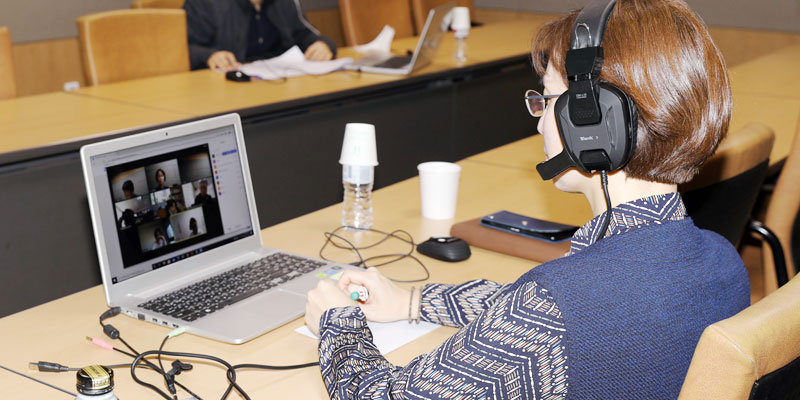 |

On Thursday, October 8, the National Assembly Research Service (NARS) hosted an expert meeting on “Child Abuse Preventive System Reform: Focusing on Publicization Model.” This meeting was held via video conference to check on the progress since the reform of child abuse preventive system which was held on October 1. Presentations and discussions were performed by Won Siyeon (Head of Health, Welfare and Gender Equality Team), Kim Hyung-mo (Professor at Kyonggi University), Park Myung-sook (Professor at Sangji University), Ryu Jeong-hee (Research Fellow at Korea Institute for Health and Social Affairs), Kim Hanki (President of Seoul Metropolitan Nowon-gu Child Protection Agency), Yoon Seok-hyun (President of Seoul Metropolitan Dongnam District Child Protection Agency), and Park Sun-kwon (Legislative Researcher at NARS).
Professor Kim Hyungmo argued that the direction of the preventive system reform needs to be toward separating field research and case studies, but have noticed the missing link—the role of local community, pointing that early detection of both field research and case studies should be based on cooperation of the local community. He also said that it is necessary to provide a variety of services to the child and family.
Professor Park Myung-sook said when recruiting more research experts, while it is desirable to recruit experts from child protection institutions with field experiences, if this is not possible then it is necessary to have at least one child protection service worker on the team head level or to hire a career expert with long-term experience in this field. Also, given the gap of infrastructure and service between the metropolitan area and the provinces, there is a need for an appropriate level or a standard to ensure service quality control.
Research fellow Ryu Jeong-hee stressed the need of the bridging role between child protection institutions and local government’s child protection team when carrying out work. To do this Ryu suggested that public coordinators play the role of manager in overall case management including needs assessment, planning, providing and monitoring services, and follow-up services.
Regarding establishment of the Nowon-gu model, President Kim Hanki said the momentum behind directly managing the child protection service was the consistent efforts of staff members wanting to do something for the children and the will of the leaders of local governments.
President Yoon Seok-hyun highlighted the need of direct service which the Dongnam district model is currently providing. Yoon pointed out that before the separation of the field research and case studies, when managing different cases, it was inevitable for case management to be centered around coordination, indirect services, and link services; however, since its separation through the provision (via counselors) of direct services such as parenting skills, emotion controls, differentiated family support, psychological tests, psychotherapy, neglected family assistance, and reunion services, the Dongnam model was able to bring change in the family and prevent re-abuse.
The meeting outcomes were fruitful: evaluation of the publicization process since the reform of child abuse preventive system, and discovery of ways to improve its quality and ensure its timely implementation.
Professor Kim Hyungmo argued that the direction of the preventive system reform needs to be toward separating field research and case studies, but have noticed the missing link—the role of local community, pointing that early detection of both field research and case studies should be based on cooperation of the local community. He also said that it is necessary to provide a variety of services to the child and family.
Professor Park Myung-sook said when recruiting more research experts, while it is desirable to recruit experts from child protection institutions with field experiences, if this is not possible then it is necessary to have at least one child protection service worker on the team head level or to hire a career expert with long-term experience in this field. Also, given the gap of infrastructure and service between the metropolitan area and the provinces, there is a need for an appropriate level or a standard to ensure service quality control.
Research fellow Ryu Jeong-hee stressed the need of the bridging role between child protection institutions and local government’s child protection team when carrying out work. To do this Ryu suggested that public coordinators play the role of manager in overall case management including needs assessment, planning, providing and monitoring services, and follow-up services.
Regarding establishment of the Nowon-gu model, President Kim Hanki said the momentum behind directly managing the child protection service was the consistent efforts of staff members wanting to do something for the children and the will of the leaders of local governments.
President Yoon Seok-hyun highlighted the need of direct service which the Dongnam district model is currently providing. Yoon pointed out that before the separation of the field research and case studies, when managing different cases, it was inevitable for case management to be centered around coordination, indirect services, and link services; however, since its separation through the provision (via counselors) of direct services such as parenting skills, emotion controls, differentiated family support, psychological tests, psychotherapy, neglected family assistance, and reunion services, the Dongnam model was able to bring change in the family and prevent re-abuse.
The meeting outcomes were fruitful: evaluation of the publicization process since the reform of child abuse preventive system, and discovery of ways to improve its quality and ensure its timely implementation.